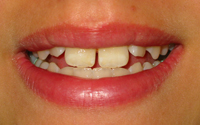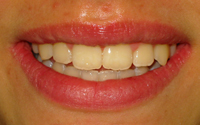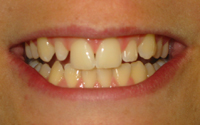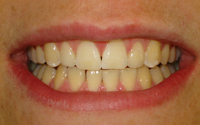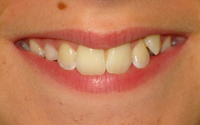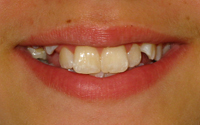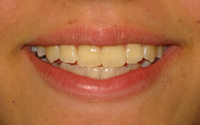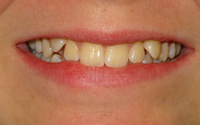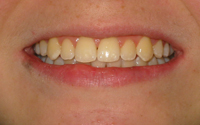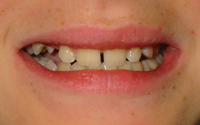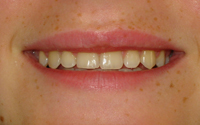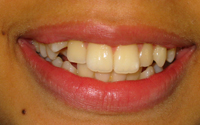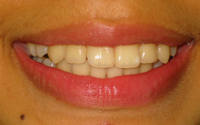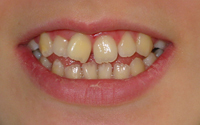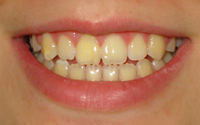Many people have crowded or crooked teeth. Orthodontic treatment will straighten the teeth or move them into a better position. This can improve their appearance and the way the teeth bite together, while also making them easier to clean.
Some people have upper front teeth that stick out and look unsightly. These ‘prominent’ teeth are more likely to be damaged, but orthodontic treatment can move them back into line. Or the way the upper and lower jaws meet can cause teeth to look unsightly and lead to an incorrect bite.
Orthodontic treatment may be able to correct both of these problems. When the teeth don’t meet correctly, this can put strain on the muscles of the jaw, causing jaw and joint problems and sometimes headaches. Orthodontic treatment can help you to bite more evenly and reduce the strain.
At what age should I have orthodontic treatment?
The best time is generally during childhood, but adults can have orthodontic treatment too – and more and more are doing so. Age is less important than having the right number of teeth. In children it may be necessary to wait for enough teeth to come through before starting treatment.
Orthodontics in Southfields – What does it involve?
The most important thing is to have a full examination. This will usually involve looking at your teeth, taking x-rays and making plaster models of your teeth.
Your dental team will then discuss what treatment is possible. Once you are sure you want to go ahead, the treatment can start as soon as you have enough permanent teeth.
Will I need to have teeth taken out to make room?
You may not have enough room for all your permanent teeth. In this case, you may need to have some permanent teeth taken out to make space. Your dental team will tell you whether this is the case. Sometimes space can be made using other forms of treatment.
How is treatment carried out?
Orthodontic treatment can be done by many sorts of appliances, which most people call a ‘brace’.
How long will it take?
The length of treatment depends on how severe the problem is, and it may take anything from a few months to two-and-a-half years. Most patients from Preventive Dental can be treated in one to two years.
What happens when the teeth are in the right position?
When treatment is finished the teeth need to be held in position for a time. This is called the ‘retention’ period, and the appliances that hold the teeth in place are called retainers.
The retainers hold newly straightened teeth in position while the surrounding gum and bone settles. The retainers can be removable or fixed, depending on the original problem.
All appliances may feel strange at first, and can cause discomfort. If the problem doesn’t go away, the orthodontist may be able to carry out adjustments to help. Teeth are usually uncomfortable immediately after a brace has been adjusted, but this will settle.
How many visits will it take?
Orthodontic braces usually need adjusting every 4 to 6 weeks. Your dentist will tell you how often your brace will need adjusting.
How successful will it be?
Success depends on both the skills of the dentist, and the enthusiasm and helpfulness of the patient (and parents, if the patient is a child). It is important to follow any instructions given by the dentist and to go to any appointments you have with them. For children’s orthodontic treatment it is very important that the patient is as keen as the parent.
At Preventive Dental, we are very passionate about providing the best dental treatment and of the highest quality. With over 30 years of experience as dentists in Wimbledon and thousands of loyal customers, we will work continuously for you to have the best smile and orthodontic treatment available. See our testimonials for more information.
Can orthodontics damage my teeth?
Your teeth can be damaged if you don’t look after them properly during treatment. The braces themselves will not cause damage, but poor cleaning and too many sugary foods and drinks can cause permanent damage to your teeth. Brackets, wires and braces can trap food and cause more plaque than usual to build up. So you need to clean your teeth and appliance very thoroughly.
Is orthodontic work permanent?
Even after retention, it is normal for minor tooth movements to happen throughout life. So no permanent guarantee can be given. However, it is unusual for teeth to alter enough to need more treatment.
To make an appointment, call us today on 020 8874 3877 or email us smiles@preventivedental.com.
See also: BOS
 Orthodontic treatment is a way of straightening or moving teeth, to improve the appearance of the teeth and how they work. It can also help to look after the long-term health of your teeth, gums and jaw joints, by spreading the biting pressure over all your teeth.
Orthodontic treatment is a way of straightening or moving teeth, to improve the appearance of the teeth and how they work. It can also help to look after the long-term health of your teeth, gums and jaw joints, by spreading the biting pressure over all your teeth.


